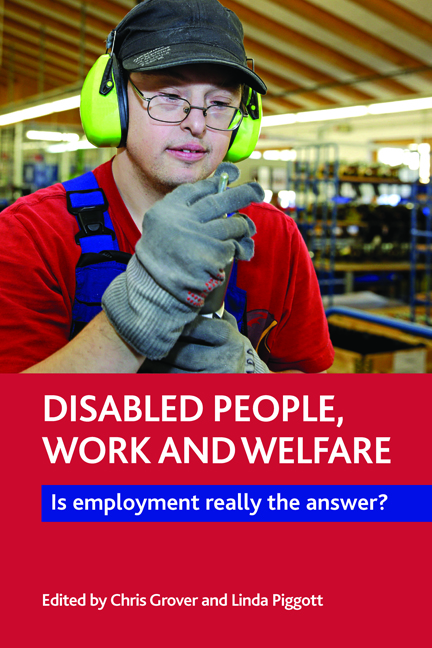Book contents
- Frontmatter
- Dedication
- Contents
- List of tables and figures
- List of abbreviations
- Notes on contributors
- Acknowledgements
- one Disabled people, work and welfare
- Part One Changing constructions of disability and welfare
- Part Two Social policy, work and disabled people
- Part Three Assistance and access to paid work
- Part Four Alternatives to, and validated lives beyond, paid work
- Part Five Conclusion
- Index
two - Disabled people, conditionality and a civic minimum in Britain: reflections from qualitative research
Published online by Cambridge University Press: 11 March 2022
- Frontmatter
- Dedication
- Contents
- List of tables and figures
- List of abbreviations
- Notes on contributors
- Acknowledgements
- one Disabled people, work and welfare
- Part One Changing constructions of disability and welfare
- Part Two Social policy, work and disabled people
- Part Three Assistance and access to paid work
- Part Four Alternatives to, and validated lives beyond, paid work
- Part Five Conclusion
- Index
Summary
Introduction
Across countries of the Organisation for Economic Co-operation and Development (OECD), there is now a marked reliance on measures that employ welfare conditionality in an effort to support and encourage people on out-of-work benefits to enter (or return to) paid employment (Gilbert and Besharov, 2011). Welfare conditionality refers to the attaching of behavioural conditions to benefit receipt, and has long been a marked feature of welfare state regimes (Deacon, 2002).
In Britain, under first New Labour governments and then the coalition government, the reach of conditionality has been considerably extended, with Dwyer (2008) characterising what has emerged as a ‘conditional welfare state’, where conditionality is accepted and embraced by all three main political parties. A particularly important policy development in this regard was the introduction of Employment and Support Allowance (ESA) in 2008. Following its introduction, many disabled people have been subject to work-related conditionality.
While the theoretical defences and government rhetoric around conditionality have been extensively interrogated from a number of standpoints (Dean, 2002; Deacon, 2004a; Dwyer, 2004; Wright, 2011), what has been lacking, with the notable exception of Dwyer (2000), is any consideration of how citizens themselves, and disabled people in particular, interpret conditionality. Drawing on qualitative research conducted with both disabled and non-disabled individuals, this chapter explores attitudes to the applicability of welfare conditionality to disabled people. The chapter starts with a review of the relevant policy and theoretical context, before outlining the methods employed to generate the qualitative data discussed in the chapter. Findings from the study are then outlined, with a focus on how far and in what ways various defences of conditionality for disabled people were utilised by the research participants. The chapter argues that, while enforcing work-related conditionality on disabled people is problematic, it could perhaps be justifiably applied in conjunction with Stuart White's (2003) notion of a ‘civic minimum’. However, the chapter also argues that currently in Britain there is what might be described as a ‘civic minimum deficit’; a gap between the status quo and what would be needed for a ‘civic minimum’ to be in place, a vital precondition to conditionality being more justly employed.
- Type
- Chapter
- Information
- Disabled People, Work and WelfareIs Employment Really the Answer?, pp. 25 - 42Publisher: Bristol University PressPrint publication year: 2015

